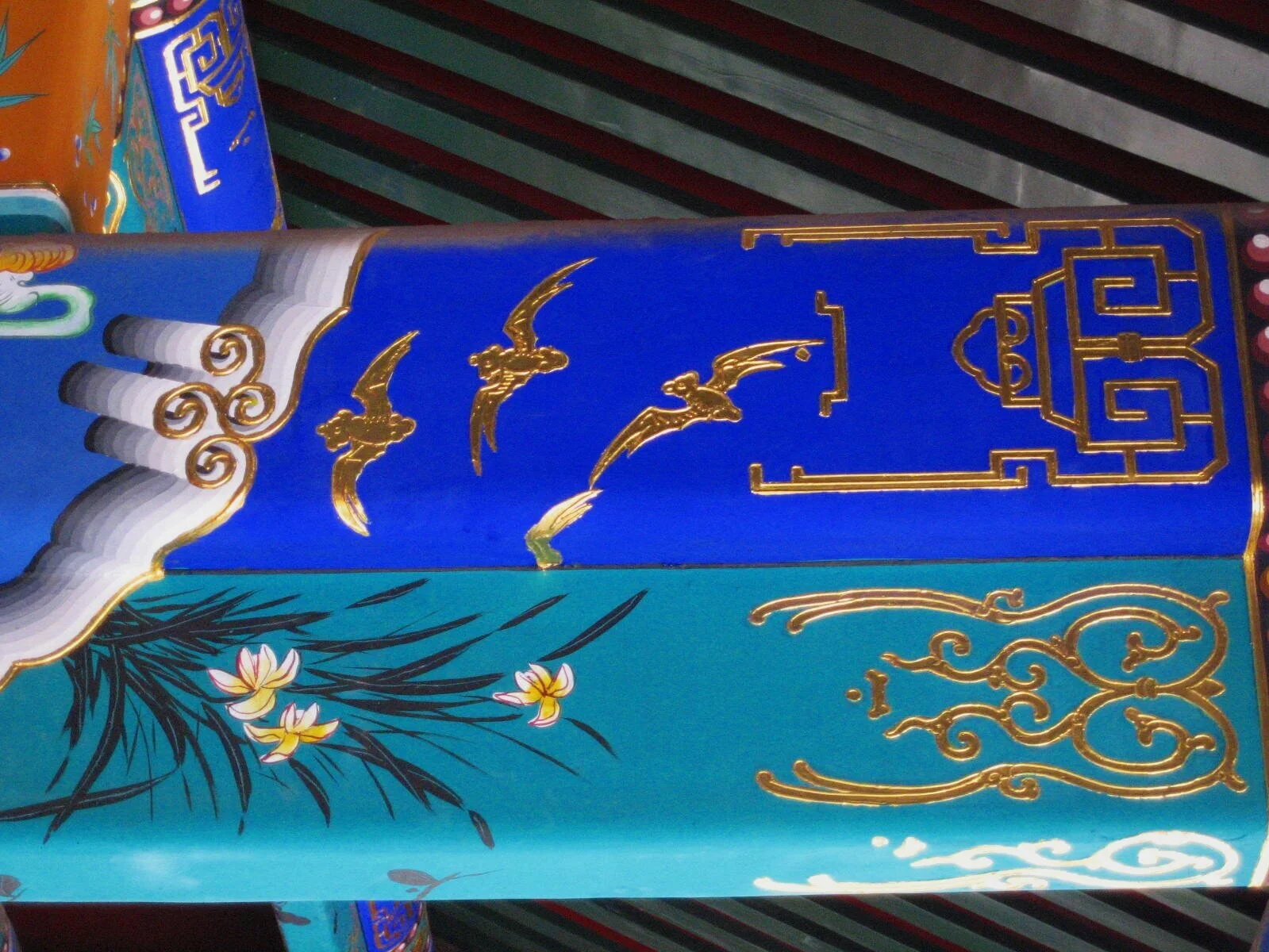#002 Here comes the good fortune /福來了
After publishing the first episode, some asked me where the Chinese of this podcast, ‘奇女子(qí nǚzǐ)’, came from. At the first glance, these two words seem to have nothing to do with each other. However, if you read it out loud several time, together with tones, the connection between these two words will become clear. I first came up with the English name for my podcast, Chillneez, and the I found out that it sounds like, 奇女子 (remarkable woman). Moreover, the last two characters,’女子(nǚzǐ), if written as one character, it becomes ‘good (好;hǎo)’. I thought to myself, ‘What a fantastic name!’
第一集開播後,有些人問了我,中文節目名稱「奇女子」是怎麼來的,乍看之下,和Chillneez感覺八竿子打不著,要是你多唸幾次,再加上聲調,就能明白了。我是先想到英文的名字以後,發現聽起來像中文「奇女子」,再加上,要是把「女」和「子」寫在一起的話,便是是個「好」字了。我心想這名字取得可真好啊!
Connecting two similar sounds to each other and give a different meaning to it is quite common in Chinese. Take my podcast for example, I use the same way to play the word game. Immediately, I thought of the number, sì (four), in Chinese. It sounds like, ‘sǐ’ (‘death’ or ‘to die’) in Chinese. In Taiwan, the button of ‘four floor’ to click on in a hospital elevator probably doesn’t exist. It is because ‘sì (four)’ sounds like, ‘sǐ’ (‘death’ or ‘to die’) in Chinese. In daily life, some people also use numbers to express what they mean in Chinese. ‘520’ is homophonic pun for ‘I love you’. Another example is the number, 88. It can represents ‘bye bye’ or you might see ‘88 Day’ on the advertisement in Taiwan on the Father’s Day , which is on the 8th of August.
這種把兩個聽起來相似的音連結在一起,並賦予另一種意思的語言現象,在中文裡面很常見。像是我的播客名字就可以通過這樣的方式玩玩文字遊戲。我馬上想到了「四」聽起來像「死」,因此在台灣,醫院裡電梯上的按鍵幾乎是沒有四樓的,因爲「四」聽起來像「死」。日常生活中,有的人也會用數字諧音來表達意思,像是數字520(五二零)來替換「我愛你」,88 (八八)or 用來代表「拜拜(bye bye)」。亦或是,在台灣父親節是八月八日,你也可能會看到一些廣告上用88節來表示父親節。
Pineapple is another popular choice for offering in Taiwan because it sounds like ‘wàng lái (旺來)’, which sounds like the prosperity comes. /
台灣人也很喜歡拜鳳梨,因爲鳳梨(在大陸叫「菠蘿」)的台語是「旺來」,代表好運財運都「旺旺來」。
Perhaps, you heard of something like this before: on Chinese New Year’s Eve, if there is a fish dish, some people will leave it unfinished, because it means that you will have ‘surplus (yú)’ each year. ‘Fish (魚; yú)’ sounds like ‘surplus (餘; yú)’. Or the must-have in Chinese New Year, the year cake (niángāo), is a common food on the menu. After eating the year cake, we wish to be able ‘to rise step by step (bù bù gāo shēng)’ in our career, ‘to have longevity (年高; nián gāo)’ or that the children can grow ‘tall (高; gāo)’ and grow up each year.
也許你聽說這樣的一個習俗:過年的時候,如果桌上有道魚的話,有的人刻意不把魚吃完,因爲這樣代表「年年有餘」,「魚」和「餘」諧音。或是過年許多人家裡必備的年糕,希望吃了以後能夠「步步高升」、「年高 (長壽)」,或者是孩子能年年長「高」長大,「高」諧音「糕」。
If you have the chance to visit some temples in Taiwan, for instance, Taipei Longshan Temple, you might see green onions (蔥; cōng) as an offering to gods. You can probably guess that people who place the offering there, or their family place it there to wish the best luck to those who are going to have some major exams in their family. ‘Green onions (蔥; cōng)’ sounds like ‘smart (聰明;cōngmíng)’ in Chinese. Apart from giving best wishes, in daily life, when it comes to giving gifts to others, some are particular about what not to give. Say, the people in a relationship do not give each other an umbrella as a gift, because umbrella (傘; sǎn) sounds like to break up (散; sàn) in Chinese. Certainly, there are also people who do not believe in this kind of ‘omen in the similar sounds’ and still give a beautiful umbrella as gift if they buy one.
如果你們有機會去台灣的一些廟裡面參觀,比方說,台北龍山寺,也可能看到有人拜的供品裡面有青蔥,可以猜得到拜的人,或是者是家人幫家裡要考試的人拜的,「蔥」諧音「聰明」的「聰」。在生活中,除了利用諧音給予祈福意外,有的人對不送什麼禮物很講究。譬如,交往中的情侶不送對方傘,因爲聽起來好像「散」了,也就是分手了。當然,很多人也不信這一套,漂亮的傘買了照送不誤。
The wooden window decoration of bats/木製蝙蝠窗花
Speaking of the homophonic puns, it’s omnipresent in daily life. I remembered that a bat flew into my parent’s house in Kaohsiung from nowhere. It was a couple of nights before the graduate school published the results of my entrance examination. We had never seen bats in Kaohsiung before. It was a terrifying sight to witness, but I remembered that my mother said instantly. ‘Ah, the bat flew into our home, it symbolises good fortune. Here comes the good fortune. You are going to be admitted to the graduate school for sure.」I have no idea whether I should say that my mom’s was right, or it was the good fortune which was brought in by that bat. I did get into the graduate school. (Note: No bat was hurt in this incident. S/he flew away by herself/himself.)
說到諧音在生活中的無所不在,我記得考研究所那一年,從沒有在高雄見過蝙蝠的我們,研究所放榜的前幾晚,家裡一樓竟然不知從哪裡飛進來一隻蝙蝠!看到的時候覺得很可怕,但是我記得我媽媽馬上說:「哎呀,蝙蝠飛進家門來,代表福來了,你肯定考上研究所了。」不知道應該說媽媽說對了,還是蝙蝠來報喜了,我確實考上了。(註:此事件中蝙蝠沒有受到傷害。牠自己飛走了。)
The painted bats on the beams of a traditional Chinese corridor. /在傳統中式走廊橫樑上漆成金色的蝙蝠。
Around a year after the visit of that bat, I saw more of them in Prince Gong's Mansion in Beijing. In Prince Gong's Mansion, the bats are everywhere. You can see them on the decoration of the wooden window frames and on the beams of the corridors. In the same year, I also went to Summer Palace in Beijing and learned an interesting anecdote about an antique clock, which Empress Dowager Cixi (1861-1908) received as a gift from western envoy on her 60th birthday. Allegedly, she accepted the gift because she feared offending the western diplomatic envoy. However, she felt that the gift was ominous because ‘to give a clock as a gift (送鐘; sòng zhōng)’ sounds exactly like ‘ to attend upon a dying parent or other senior member of one’s family (送終; sòng zhōng)’ so she regifted it to Li Lianying, her favourite attendant. Li Lianying knew the ways with people well and had a smooth tongue, and he was also quick-witted. Upon receiving such an ominous gift, he asked if the empress could give him a pair of vases as gift. He then thanked the empress that she made ‘to attend upon a dying parent or other senior member of one’s family (送終; sòng zhōng)’ into her best wishes to him. His fantastic interpretation was that the clock (鐘; zhōng) gave rise to (生; shēng) the vases (瓶; píng), which sounds like a whole life with peace and tranquility (終生太平; zhōngshēng tàipíng). The empress was surely very pleased with this interpretation.
那隻來報喜的蝙蝠到訪大概一年後,我在北京恭王府看到更多的蝙蝠。在恭王府裡,木製窗花上、走廊的樑柱上,蝙蝠隨處可見。同一年我還去了頤和園,得知了一個關於慈禧太后(1861-1908)有趣的軼事。據說她六十大壽的時候,某位外國使節送了慈禧太后一座鐘,慈禧太后因爲不敢得罪對方而不收,但收了以後又覺得不吉利,因爲「送鐘」諧音「送終」,因此她馬上轉送給她的親信李蓮英。李蓮英做人和說話都很圓滑,做事也很機靈,他靈機一動請慈禧也送他一對花瓶,然後他感謝慈禧太后把「送終」變成了祝福他的話。他巧妙地把「鐘」生「(花)瓶」解讀成諧音「終生太平」。想當然爾,慈禧聽了以後開心得不得了。


